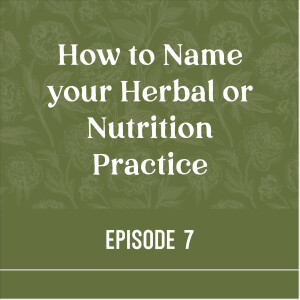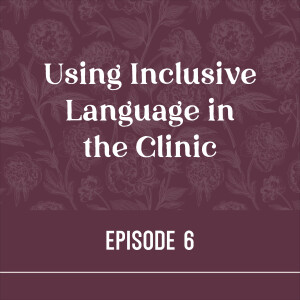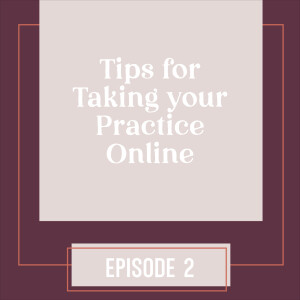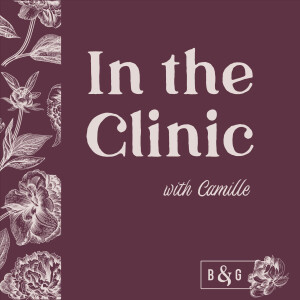Episodes

Saturday Sep 05, 2020
Saturday Sep 05, 2020
When you're in practice, identifying your core values helps you stay aligned with your highest intention.
One of the things I do regularly - at least every year or two - is revisit my statements about what I do and who I serve/my "ideal clients."
I find that this is a helpful practice, but it's not quite enough.
It's also important to think about the WAY you do what you do. I find that this stems from your core values: the things that are most important to you as a person and a practitioner.
It can be tricky to identify these, but once you do it is extremely helpful in writing and speaking about what you do.
When you're clear about this, you can more easily help your clients identify whether you'd be a good fit for them.
In this episode, I share a reflection question that helped me identify my core values.
I hope it helps you as well.
Learn more about the Roots course if you're just getting started. It will help you get your ducks in a row before opening your doors (website, insurance, business banking, etc). Start anytime 💚
--- Send in a voice message: https://www.intheclinic.com

Sunday Aug 09, 2020
Sunday Aug 09, 2020
It's time to get your practice up and running.
One of the first steps is to name your practice. For some people, this can be a real stumbling block. It feels like a huge decision. Don't let this hold you up! I've included a few things to consider below, with more in the podcast episode. It's also helpful to know that it's pretty easy (from a business/legal perspective) to change your name later. For example, if you file as an LLC you can pay a small, one-time fee and add a "Doing Business As" name to your registration.
Tips for picking a practice name
Consider including the name of your city, state, region if you'll be primarily working locally
Don't use hard-to-spell words if you can avoid it
Pick something relatively short (3-4 words or so)
Google the name to see if it's already being used
Do an "entity search" in your state to see if the name has already been registered.
Check with the patents & trademarks office to make sure the name isn't trademarked
See if any urls associated with your name are in use. Your url doesn't need to match your business name, but if someone is already using a similar url it may cause confusion for your clients
Avoid using your own name in the practice name, in case you want to grow your practice or sell it/pass it along to another practitioner down the road.
If you're looking for a guided process as you work through getting your practice up and running, come join me in the 10-week Roots: Foundations of Clinical Practice online course. Each week you'll have a few simple tasks to complete, and by the end of the course you'll be ready to open your doors. Start anytime 💚
--- Send in a voice message: https://www.intheclinic.com

Friday Jul 24, 2020
Friday Jul 24, 2020
Using Inclusive Language in the Clinic
As a clinician, you're probably used to speaking or writing in a particular way. It's helpful to evaluate your language periodically to make sure you're choosing words and phrases that create a welcoming and inclusive environment. While I know most of us have good intentions, we also have a lot of room for improvement (and I include myself here!).
Here are a few things to consider in your written language:
List your pronouns on your website, in your bio, and in other marketing/promotional materials
Leave blanks for clients to indicate sex and gender on your forms, rather than providing binary choices
Ask clients which pronouns they use on your intake form or at the beginning of your visit
In the "Family History" section of your intake forms, ask clients to list family members and relevant illnesses or conditions rather than specifying "mother" "father" etc.
Use parent(s) or guardian(s) rather than mother/father; do not assume parents are married
Use partner/spouse rather than husband/wife; do not assume people have only one partner or spouse
Check your intake forms for questions about reproductive organs; ask the same questions to all clients. Put a "not applicable" box for people to check if relevant.
Here are some considerations for spoken language:
"Died from suicide" rather than "committed suicide"
"Person with diabetes" rather than "diabetic" (same applies for other conditions: alcoholic, etc.)
"Older adults" rather than "elderly"
"Under-resourced" rather than "inner city"
"Neighborhood with high poverty rates" rather than "disadvantaged"
"They" rather than "he/she" if gender unknown
"Hey y'all" or "Hey folks" rather than "Hey guys" (or, à la the Sleep with Me podcast, “Ladies, gentlemen, and friends beyond the binary”)
"Bananas" or "wild" rather than "crazy" or "insane"
"Not cool" rather than "lame"
"The public" rather than "citizens" or "Americans" [situational]
"Different sex" rather than "opposite sex"
"Pregnant person" or "person who is nursing" rather than "pregnant mother" or "nursing mother”
Resources for Inclusive Language
Northwestern University Counseling Inclusive Language Guide
An Incomplete Guide to Inclusive Language for Startups and Tech from Buffer
18F Inclusive Language Content Guide
Culturally Responsive Evaluation and Treatment Planning
Focus on Forms and Policy: Creating an Inclusive Environment for LGBT Patients
The Racist Origins of Seven Common Phrases
Fat Phobia and Its Racist Past and Present episode of the ShortWave podcast (not specific to inclusive language, but speaks to BMI and how we view/talk about healthy weights - more on this later)
--- Send in a voice message: https://www.intheclinic.com

Thursday Jul 02, 2020
Thursday Jul 02, 2020
Have you ever looked through an intake form and started to feel a bit of panic?
I think we've all been there.
It's easy to feel like you're not good enough, you don't know enough, and you'll never be able to help this person.
You are not the only one who's felt this way.
In this episode, I share a few tips for staying calm, trusting yourself, and getting help when you need it.
Many times, it comes back to your underlying philosophy. What kind of work do you do? If you think your job is to fix, to take charge, or to know it all, then that may be feeding your anxiety.
Have a listen, and share your thoughts below.
Getting Support
Don't forget, you don't have to do this alone! Here are a few resources:
Herbal Observation Groups
Mentoring with me
List of AHG mentors
--- Send in a voice message: https://www.intheclinic.com

Sunday Jun 07, 2020
Sunday Jun 07, 2020
Testimonials can be powerful marketing tools.
When I was doing research for my recent webinar on how to find clients without using social media, I kept running across the recommendation to use testimonials.
Sometimes known as "social proof," they can reassure potential clients that you're a legitimate practitioner and that others have benefited from working with you.
Almost all online marketing/business-building courses and gurus will tell you to include testimonials on your sales pages and in your marketing materials if you have them.
When clients are singing your praises, it does seem like a good idea to build on that enthusiasm so that future clients can see they'd be in good hands.
Not so fast.
As healthcare practitioners, we are automatically in an uneven relationship with our clients in terms of power dynamics.
Their care is our first priority.
We have to ask ourselves if there are any possible risks to our clients or to our relationship with our clients when we ask for or use a testimonial or review for self-promotion.
Could doing so affect your work together? Might the client feel compelled to oblige? Are there any risks to the client if their testimonial is published online or in other marketing materials?
Most organizations for counselors and therapists prohibit the solicitation of testimonials for these reasons. Rob Reinhardt (2015) has written about the Ethical pitfalls of online testimonials and reviews from a counseling perspective, but I think these are relevant considerations for integrative practitioners as well.
What about if your work with a client is complete? What if they sent you an unsolicited testimonial? Thes are mitigating factors that may change your willingness to use them.
There isn't a single correct answer here.
I urge you to think about these issues and decide what feels comfortable and right for you. I share what I've decided for myself at the end of the episode.
I hope you find it helpful.
If you decide to use testimonials:
Give your client the option to stay anonymous, use a pseudonym, or use initials only
Be sure you have your client's permission and that they understand what will be posted online and any possible negative repercussions
Make sure the content is true (both what is implied and what is explicitly said) so that you don't run afoul of the FTC
--- Send in a voice message: https://www.intheclinic.com

Thursday Apr 23, 2020
Thursday Apr 23, 2020
How to Make Violet Syrup
Harvest 2-3 cups of violet flowers.
Remove calyces (green part at base of flower) and stems and put flowers in a glass jar
Bring 2-3 cups of filtered or distilled water to a boil. Allow to cool slightly before covering violet flowers. Fill jar until flowers are covered with 1-2 inches to spare (they float so the inches will be at the bottom)
Cover with something non-metallic and non-plastic and allow to sit overnight or for 24 hours
Strain flowers out of water and admire the beautiful color/scent.
Measure how much liquid you have now. Add it to a pot. Add double that amount (or 1.5x) of white sugar into the pot as well.
Heat VERY gently until all of the sugar has dissolved. Give ti a few more stirs adn remove from heat.
If desired, add a few drops of lemon juice and/or a single frozen blueberry to deepen the color. (If using blueberry, strain out after mixture cools.)
Allow to cool, add a lid and store in the fridge for 3-6 months
What to do with Violet Syrup
Use it like regular syrup (pancakes, waffles, etc)
Use as a topping for vanilla ice cream
Add to baked goods for flavor
Make fancy drinks out of it (see below)
Add to whipped cream for trifles or dipping fruit/chocolate
Mix into icing for cake or cookies
Add to hot or iced teas in place of honey
Image by Camille Freeman
Fancy Violet Beverage
I don't have a cute name for this, but I'm open to ideas!
Ingredients
1-2 ounces gin (vodka works, too)
Juice of 1/4 - 1/2 lemon
1-2 TBSP violet syrup
6-7 ounces sparkling water
spring of mint or lemon balm for garnish
Directions:
Pour all ingredients over ice, stir or shake, and enjoy.
--- Send in a voice message: https://intheclinic.com

Monday Mar 16, 2020
Monday Mar 16, 2020
If you're moving away from face-to-face consultations due to the coronavirus, here are some quick tips for working with clients from a distance.
Resources mentioned:
How to set up a Google Voice number
Practice Better (referral link)
Five Flavors Herbs Custom formulations
SendInc for sending secure emails
Fullscript
Have a question or need help getting started with your virtual clinic? Please reach out.
--- Send in a voice message: https://www.intheclinic.com

Sunday Mar 08, 2020
Sunday Mar 08, 2020
Welcome to episode 1! Today, I discussed whether fennel is safe to use during pregnancy & some of the evidence that informs my opinion. For a list of references, please visit www.intheclinic.com/1
--- Send in a voice message: https://intheclinic.com

Thursday Jan 16, 2020
Thursday Jan 16, 2020
Look for the first episode in March, 2020. Until then, check out this short trailer to find out what you can expect from this podcast. My hope is that the podcast will provide support, encouragement, food for thought, and ongoing education for herbalists and nutritionists. If you have feedback, topic requests, or questions, please submit them: https://intheclinic.com







